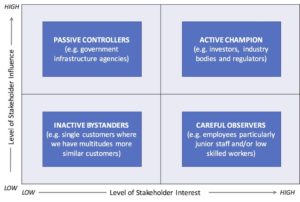
Businesses do not exist in a vacuum they are always part of a value chain that includes suppliers and buyers. Another organisation supplies raw materials, manpower, etc to the business . Similarly, other individuals and/or organisations will purchase the products that the business supplies. Both the suppliers and the buyers are stakeholders in the business.
DEFINITION: A stakeholder is any person, organisation, group or body that has an interest in an organisation. Their concern and interest is drawn from the fact that they could impact or be impacted by the activities of that organisation.
Who are your stakeholders and what are their interests in a business?
We have already mentioned suppliers and buyers.
1. Suppliers

Suppliers will benefit from growth and expansion in the business. They will also be adversely impacted if performance of the business declines as this means less sales by the supplier. The success of a business therefore influences the success of its suppliers. But this isn't all. If a supplier increases its prices or completely folds-up and the business has no suitable alternatives, the actions of the suppliers will impact that business.
2. Customers/Buyers
 Customers/Buyers put money in our business to enable the business to keep operating. If a business loses a major customer or a series of customers, the performance and possibly the survival of that business will be impacted. Similarly if a major customer endorses our products, this will attract many more customers and help our business grow.
Customers/Buyers put money in our business to enable the business to keep operating. If a business loses a major customer or a series of customers, the performance and possibly the survival of that business will be impacted. Similarly if a major customer endorses our products, this will attract many more customers and help our business grow.
It is easy to see why suppliers and customers will be classified as stakeholders. These two groups are the obvious ones. But there are many others that a business should be aware of.
3. Competitors
These are not usually considered as stakeholders. However, competitors can change the landscape of the industry that we operate in. Their individual actions such as a drastic price drop or the introduction of a new competitive product would impact our business. Furthermore, many industries have bodies that collectively decide on the future of that industry. For example, one of the objectives of the Pharmaceutical Society of Nigeria PSN is "To maintain a high standard of Professional ethics and discipline among its members". The PSN is made up of registered pharmaceutical organisations, who on the one hand are competitors and on the other hand collaborators in setting such standards. Competitors should therefore be considered as key stakeholders as their actions individually or collaboratively could impact our business.
 4. Employees
4. Employees
Employees are interested in the future of the organisation and its ability to provide salaries today and job security in the future. Where employees have a degree of uncertainty about the business' ability to meet these "personal" objectives, their commitment will dwindle, which in turn will impact the productivity and performance of the business.
5. Financiers
This group may include investors who want to get a return on their investment and/or lenders who need assurance that the business will be able to repay a loan.
6. Regulators

They determine the legal framework within which an organisation operates. They issue (and revoke) licenses to operate, for instance in the telecoms industry. They control the quality of products that than be offered to consumers such as in the pharmaceutical companies and much more.
 7. Members of the public
7. Members of the public
This general group potentially also influence organisations activities. For instance, protesters across the world have regularly stopped or delayed activities by petroleum companies including SHELL.
For your business, there could be other stakeholders, but most can be covered under the headings above.
How is it possible to court so many stakeholder groups?
Business need to consider a wide range of stakeholders. However, it could end up spending so much time courting each of these groups, from every single customer, to each supplier and all the way to the regulators. This will take so much time, effort and resource that the business risks neglecting its core business. The key to avoiding this risk is to develop the right courting strategy for each group.
Stakeholder mapping enables a business to group and manage its different stakeholders depending on their level of interest and influence as shown below.
The level of interest of a stakeholder can be determined by what they have at stake within the business (financially or otherwise) and how this impacts their own survival.
The level of influence can be determined by how much the stakeholder could impact -positively or negatively the future and survival of the business.

Starting at the bottom left - The Inactive Bystanders have very little interest in the business and have very little influence. These could be a single customer where a business has millions of similar customers and the customer has multiple options. The way to court such a stakeholder is to simply keep them informed via general communication with an aim to increase their level of interest in the business, without increasing their level of influence. We want that customer to buy more and become more dependent on our product.
The second group, the Careful Observers are those that are interested because the success of the business will have an impact on them. However, they have limited influence. Employees, especially junior members of staff and low skilled employees, often fall within this group (not necessarily the case where there is a strong union). It is important that the business regularly engages with these group, keeps them informed and consults them on aspects of the business that are of interest to them. Employees should be informed of the future plans of the business and its financial health. They should celebrate the success of the company. These actions will help increase the interest and affinity of the employees in the business.
Both of these groups should be monitored closely. It is important that a business doesn’t dismiss any stakeholder, but it continues to monitor their interest and influence. Groups that are uninterested today and of little influence such as the general public, could be more influential that you think because of the sheer size of the group. One individual cannot stop a business from operating but can be very powerful when similar stakeholders group together. In 2010, an online protest which was started by Greenpeace gathered momentum when members of the public supported the social media campaign. Suddenly the action of a low interest/low influence stakeholder group - the general public - was strong enough to make Nestlé to move to sourcing palm oil from more environmentally friendly sources.
The third group are highly influence, but have little or no stake or interest in the business and in its success. These are the Passive Controllers. Their actions, consciously or subconsciously would have a significant impact on the business. Hence, it is important to keep such parties informed and engaged about business activities with the aim to increase their level of interest. An example is a business manufacturing food products which is location in a community with poor infrastructure. The Ministries of Transport and of Infrastructure are potentially key stakeholders. However, these ministries have little interest in or knowledge of the business because they have little to gain from the business' activities. Through engagement and keeping these ministries informed about the positive impact of the factory within the community, the ministries could decide to improve the road network and other infrastructure, which would significantly benefit the business.
Finally, stakeholders with high interest and influence - Champions are very critical as they can make or break your business. Such stakeholders usually include major financiers of the business as well as regulators and industry bodies.
It was recently announced that the Uber brand lost its operating license in London. Uber launched in London, UK in July 2012 and 5 years later, Transport for London, the body that manages and licenses all transportation services in London announced that Uber was not “fit and proper” to hold a private hire operator licence. This is a damning assessment. Uber seem to have ignored the basic rules of stakeholder management - "to know and court your stakeholders".
Another example closer to home is in the pharmaceutical industry. Previously, almost any organisation or individual could import pharmaceutical products into Nigeria for sale to members of the public. The formation of the National Agency for Food and Drug Administration and Control (NAFDAC) in 1993 changed this. NAFDAC stipulated that every product had to be NAFDAC registered. This body was not interested in the daily operation of every small scale pharmacy in the country, however they significantly influence those businesses. Following this ruling, many businesses realised that their products did not meet the required standard and they were forced to shut down.
This stakeholder group - the Champions - should be treated with utmost priority. Efforts must be made to engage with senior influencers within the group, speak with them regularly and never make decisions without informing and/or consulting them. Whilst it could be expensive and time consuming, it will save the business a lot of time and angst in the future.
In summary, the 4 step process for effective stakeholder management are:
- Identify all the stakeholders for your business (Think broadly about various groups, not just the obvious ones)
- Identify their level of interest and influence (Be critical in this process and do not place every stakeholder as a champion. The simple definitions above of interest and influence will help)
- Define strategies for engagement and courting (be mindful not to develop strategies that will take over management time as this will not be sustainable)
- Activate plan (and actively monitor the plan to avoid surprises)
For more business tips, sign-up for our newsletter today. Also, don't forget to add a comment or your feedback below.
Recent Posts
- CURIOSITY: THE FUEL THAT CHANGES THE WORLD 28/06/2022
- 6 LESSONS IN TURNING SETBACKS TO SUCCESSES 11/01/2022
- COVID19 – 5 STRATEGIES EVERY BUSINESS SHOULD EXPLORE 01/05/2020
- WHAT ENTREPRENEURS SAY THEY WANT vs. NEED . 22/02/2019
- 10 REASONS WHY AGRICULTURE IS IMPORTANT TO NIGERIA 11/02/2019
Sign-up for our newsletter
